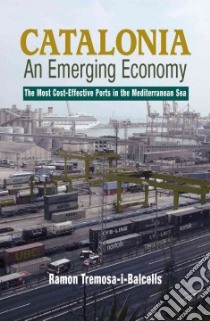Catalonia - 9781845193690
Un libro in lingua di Tremosa i Ramon Balcells edito da Intl Specialized Book Service Inc, 2010
- € 47.00
- Il prezzo è variabile in funzione del cambio della valuta d’origine
In the 21st century Catalonia needs infrastructure that is conceived and managed with a global vision, to take advantage of opportunities that today are equally global: the new economic geography of the world offers the coast of Catalonia and Valencia opportunities of the first magnitude, thanks to the recovery of the Mediterranean's strategic value in world trade.
The Mediterranean sea is on course to claim the highest volume of maritime trade in the world in the 21st century. This anticipated expansion will be due in part to the growth of the Asia-Europe trade corridor, complemented by the proposed Suez Canal enlargement. The Catalan ports of Barcelona and Tarragona and the port of Valencia offer the most efficient and cost-effective entry ports on the Mediterranean, and are poised to gain ascendancy over other European ports offering comparable services. Economists and business leaders predict that Asia will shortly be the main industrial platform in the world, while Europe will become the world's largest consumer market. Forecasts of the consequences of this phenomenon for Catalonia seem to be on track, given that in 2008 for the first time ever the ports of Barcelona and Valencia outdid the container traffic (measured in TEUs) of the French port of Marseille and Genoa in Italy.
Catalonia is the most important industrial region on the Mediterranean, with large modern industrial centres near its ports: the chemical and automotive industry clusters are the Mediterranean's largest, while other ports are mainly dedicated to transhipment traffic or coastal trade. Catalan ports are thus able to add value to semi-manufactured goods imported from the emerging economies in Asia, Africa and Latin America. It is anticipated that over the next century Catalan ports will play a similar role to those of Flanders and the Netherlands, which in the twentieth century were at the forefront of the expansion of trade across the Atlantic. Given these circumstances, it is not surprising that global logistics operators rate Barcelona as the primary and most important entrance port for Asian and African trade with Europe on the Mediterranean sea.
"One of the most important books ever written about Spain during the Civil War and the years leading up to it is The Forging of a Rebel by Arturo Barea. More autobiography than novel, the book's three volumes provide vivid accounts of life in Madrid in the early years of the century, of the experiences of conscripts during Spain's African wars, of growing social tension during the Second Republic and of the horrors of war in Madrid." From the Preface by Series Editor Paul Preston, London School of Economics
Barea's trilogy The Forging of a Rebel was well received by George Orwell, "An excellent book...Senor Barea is one of the most valuable of the literary acquisitions that England has made as a result of Fascist persecution"; and Gabriel Garcia Marquez, "The best novels written by a Spaniard in Spanish since the Civil War." He is unusual in that he was one of the first Spanish working-class writers, one of the first autobiographers in Spain, and someone who published mainly in English though all his attention was focused on Spain.
"De la Mora is clearly one of the most exciting female figures from the Spanish Civil War. Many issues about De la Mora's life and work have remained a mystery. Dr Fox sets out to unravel those mysteries and to elucidate, through her meticulous and brilliant research, the intricate political intrigues that affected De la Mora's life. Of special interest is the provenance of her excellent autobiography on the war, In Place of Splendor, one of the most compelling memory texts about the war." Shirley Mangini, Professor Emeritus, State University of California
Her fame seemed guaranteed by the compelling story of her life. She had been an aristocrat turned Communist, a celebrated author, and an international political figure whose acquaintances and collaborators included Stalin, Eleanor Roosevelt, Ernest Hemingway, Tina Modotti, Vittorio Vidali, and Anna Seghers among many others.
"Gareth Stockey covers a subject central to Anglo-Spanish relations during the two dictatorships of Miguel Primo de Rivera and Francisco Franco and the tumult of the Second Republic and the Civil War. The book's approachability is enhanced by its highly vivid sense of place and people. It delineates superbly the acute social and economic differences on both sides of the Spanish frontier and does so in a way that clarifies the fluctuations in the close relationship between both communities. Dr Stockey's work is also informed by a real sensitivity to the social impact of diplomatic issues on the population in both Gibraltar and Andalucia." From the Preface by Series Editor Paul Preston, London School of Economics
Informazioni bibliografiche
- Titolo del Libro in lingua: Catalonia
- Sottotitolo: An Emerging Economy: The Most Cost-Effective Ports in the Mediterranean Sea
- Lingua: English
- Autori : Tremosa i Ramon Balcells
- Editore: Intl Specialized Book Service Inc
- Collana: (Hardcover)
- Data di Pubblicazione: 30 Gennaio '10
- Genere: BUSINESS and ECONOMICS
- Argomenti : Harbors Spain Catalonia Transportation Spain Catalonia Infrastructure (Economics) Spain Catalonia
- ISBN-10: 1845193695
- EAN-13: 9781845193690


